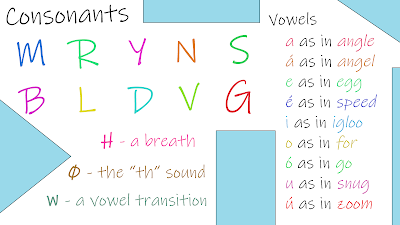Obviously these journeys and questions never have a true ending, it's more just that you reach a natural point for an intermission. With that in mind a few loose ends are worth commenting upon.
The main one concerns the snake-like letter S.
We noted before that the S sound was essentially a Z sound with a "push of air" (we kept the S symbol though as it was suitably snake-looking). Keeping it turned out to be fortunate as I'd forgot about the "Sh" sound - as in the word shush.
With the other letters we've been using the letter H as a way of amending the core consonants - to add that push of air. For example, to create the P sound in our new alphabet we use B + H - as we deemed P to be the B consonant with a push of air.
So in our P-less alphabet the word push would be rendered bhush.
Following this logic S would also be a Z with a push i.e. Zh. However, we really need that H to lift the S/Z sound into the Sh sound.
Shush
The Sh sound really is quite unique. It's very similar to hissing, but it's a bit more whistle-like. It's almost a hiss approaching a whistle if that makes sense. (As I often say; making these sounds with your own mouth really helps. Just reading the words and symbols from the page doesn't quite convey the actual sound made, nor the mechanics utilised by the mouth.)
When I was thinking about all this the word whistle itself couldn't fail to strike me. It has the W at the start - the very mouth shape we make when whistling. Plus it contains the word, or rather the sound: hiss. W-hiss-ling. (There really is a certain beauty to how logical our language is.)
Anyway, as noted, it was very fortunate we didn't throw out the S symbol to render S as Zh.
In theory we could've used multiple H letters to make the Sh sound - to emphasise the sheer amount of "air pushed out". Zhhhhuzhhhhh! As opposed to zhuzh - which would just give us something that would sound like sus. That would perhaps be a tad too whacky though - even by our standards.
So we'll have to keep Sh as it normally is in the English language, and have S as just a normal S - with no way of differentiating between the slightly different Z and S sounds we have in English.
I think this is probably fairly fine though, and fittingly it brings us right back to where we began this entire blog series. In that very first Constellation Consonants post the letter I chose to remove was Z. Precisely because it was so underused and superfluous ..and as I said in that article we won't miss Z once we get used to not having it :)
Finally: The Actual Alphabet
I've knocked up a final image listing the letters we were eventually left with once everything unneeded was stripped out.
(The final alphabet - click to enlarge)
Again, there's no true ending to these investigations. In fact, it would be really interesting to look further into how pitch is naturally used in language. For instance the way lower vowel sounds are often used to signify things that are low (and also big), and how higher sounds are often used to signify things that are high (and likewise things that are small).
The words low and high being good examples in of themselves. Low having a deep "O" sound and high having a higher "I" or "eye" sound. Hill and hull (or hole) also spring to mind. A hill being an upwards hump and a hull or hole being a downwards one. It makes perfect sense that we would naturally gravitate towards language that mirrors the actual mechanics of the sounds made. These things are ingrained in the fabric of reality. A thick bass guitar string makes a deep bassy sound, whereas a tiny high E string gives a high pitched one. So the association between low and big and high and small is commonly rooted in experience. Just look at words such as tiny and teeny-weeny and then compare them to words like huge and enormous.
This natural musicality of language seems quite underexplored and underappreciated to me. So if we do start a fresh page of notes and observations that could be the place to start.
For now though I think we can leave it there.
/////////////
[The complete pdf book can be downloaded for free from here:
As can the work Birth Family Tribe Love Sex Apotheosis ]
